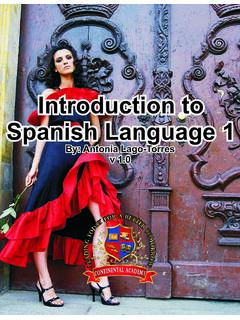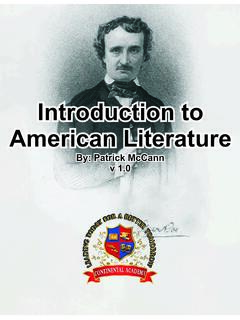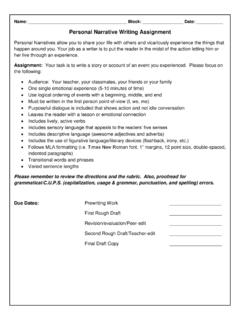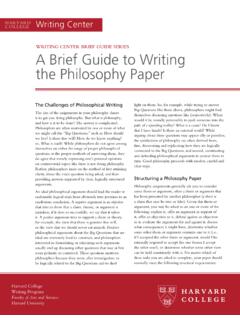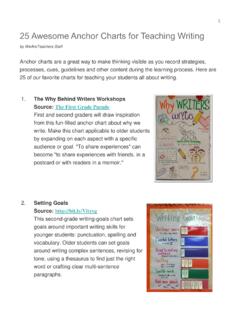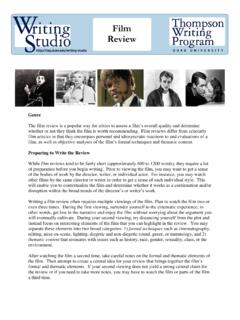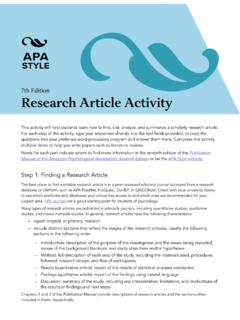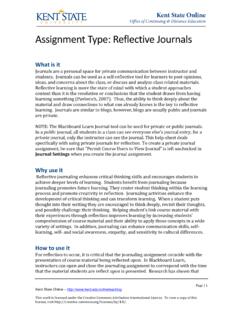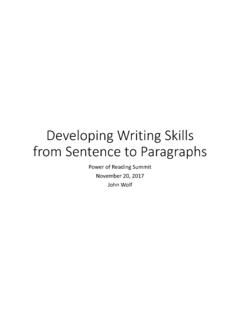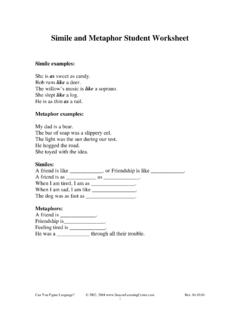Transcription of Introduction to Literature - Continental Academy
1 Introduction to LiteratureIntroduction to LiteratureBy: Patrick McCannv : Patrick McCannv 2 INSTRUCTIONS Welcome to your Continental Academy course Introduction to Literature . It is made up of 7 individual lessons, as listed in the Table of Contents. Each lesson includes practice questions with answers. You will progress through this course one lesson at a time, at your own pace. First, study the lesson thoroughly. Then, complete the lesson reviews at the end of the lesson and carefully che ck your answers. Sometimes, those answers will contain inform ation that you will need on the graded lesson assignments. When you are ready, complete the 10-question, multiple choice lesson assignment . At the end of each lesson, you will find notes to help you prepare for the online assignments. All lesson assignments are open-book. Continue working on the lessons at your own pace until you have finished all lesson assignments for this course.
2 When you have completed and passed all lesson assignments for this course, complete the End of Course Examination. If you need help understanding any part of the lesson, practice questions, or this procedure: Click on the Send a Message link on the left side of the home page Select Academic Guidance in the To field Type your question in the field provided Then, click on the Send button You will receive a response within ONE BUSINESS DAY Introduction TO Literature 3 About the Mr. Patrick McCann taught English (Language and Literature ) 9 through 12 for the past 13 years in the Prince Georges County (MD) school system. He holds s from the University of Maryland (College Park) in English (1980) and English Education (1991). Mr. McCann was a Master Teacher in the Intel Teach to the Future Technology Program in 2002 and 2003.
3 Previously, Mr. McCann lectured numerous sessions of African-American Culture to fellow teachers in Prince Georges County, MD. His Advanced Placement Certificate in teaching is current through June, 2009. Introduction to Literature LA20 Editor: Reid Friedson, Copyright 2008 Home School of America, Inc. ALL RIGHTS RESERVED The Continental Academy National Standard Curriculum Series Published by: Continental Academy 3241 Executive Way Miramar, FL 33025 Introduction TO Literature 4 Reading and analysis of fiction, drama, epic poetry, mythology, and non-fiction. Techniques from Introduction to Language Arts are applied to more-in-depth reading selections. Student will know how to read for perspective. Student will understand the human experience Student will know evaluation strategies Student will know the various communication skills Student will know the various communication strategies Student will know how to apply knowledge to print and non print texts Student will know how to evaluate data Student will develop research skills Student will develop multicultural understanding Student will participate in society Student will apply language skills Student will understand social, ethical.
4 And human issues Introduction TO Literature 5 Introduction TO Literature Table of Contents LESSON Page Lesson 1 writing 7 Lesson 2 Fiction 23 Lesson 3 Epic Poetry and Mythology 47 Lesson 4 Nonfiction 73 Lesson 5 Drama 89 Lesson 6 Essays 125 Lesson 7 Essay writing assignment 133 End of Course Review 134 Introduction TO Literature 6 THESE LESSONS FEATURE READINGS CAREFULLY SELECTED FROM VARIOUS CATEGORIES OF BRITISH Literature .
5 AFTER EACH PORTION OF READING ARE DOZENS OF QUESTIONS AND PLENTY OF SPACE FOR YOU TO WRITE YOUR ANSWERS. SOME LESSONS INVOLVE STEPS/PRACTICE IN writing GOOD ESSAYS. THEY LEAD TO THE LAST LESSON WHICH REQUIRES YOU TO WRITE A 500-WORD ESSAY. LIKE ALL LESSONS, THIS WILL BE GRADED. IN ORDER TO INCREASE YOUR LEVEL OF UNDERSTANDING THE READINGS AND YOUR ABILITY TO WRITE AN ACCEPTABLE ESSAY, IT IS IMPORTANT THAT YOU ACTUALLY DO THE writing . IF YOU ARE TAKING THIS COURSE ON A COMPUTER, DO THIS writing ON YOUR OWN PAPER. DO NOT TURN IN ANY OF THIS WORK. DOING THE WORK SHOULD INCREASE YOUR GRADE ON THE SEPARATE assignment AT THE END OF EACH LESSON. Introduction TO Literature 7 Lesson 1 writing Lesson Literary Terms Look up the following terms in a dictionary or Google them online. Please fill-in the term matching the following definitions from the choices below.
6 Do those you know for sure first. 1. Words with similar meanings _____ 2. Action, or sequence of events, in a story _____ 3. Basic meaning or main idea of a literary work _____ 4. When and where a story takes place _____ 5. Graphic organizer used to compare and contrast _____ 6. Where one goes to find synonyms _____ 7. The part of a word that contains the main meaning _____ 8. Letters added before a word to change its meaning_____ 9. Letters added to the end of a word to change meaning _____ 10. Figure of speech that compares two things indirectly _____ 11. Figure of speech that makes a direct comparison between two things using the words like or as _____ 12.
7 Pre- writing technique where the writer makes a list of ideas that he or she may write about _____ 13. Pre- writing technique where the writer groups similar ideas _____ _____ Choices: Brain-storming Metaphor Plot Prefix Root Setting Simile Suffix Synonyms Theme Thesaurus Venn Diagram Webbing Introduction TO Literature 8 ANSWERS FOR LITERARY TERMS LESSON 1. Synonyms: Words with similar meanings 2. Plot: Action, or sequence of events, in a story 3. Theme: Main idea of a story 4. Setting: When and where a story takes place 5. Venn Diagram: Graphic organizer used to compare/contrast 6. Thesaurus: Where one goes to find synonyms 7. Root: the part of a word that contains the main meaning 8. Prefix: Letters in a word prior to its main meaning 9.
8 Suffix: Letters in a word after its main meaning 10. Metaphor: Figure of speech that compares two things indirectly 11. Simile: Figure of speech that makes a direct comparison between two things using the words like or as 12. Brain-storming: Pre- writing technique where the writer makes a list of ideas that he or she may write about 13. Webbing: Pre- writing technique where the writer groups similar ideas PRACTICE ACTIVITY FOR LESSON [Answers: At end of Lesson 1] Directions: Select the letter of the best answer 1. _____ is making a quick list of ideas. a. Venn diagram c. Brainstorming b. Webbing d. Metaphor 2. _____ is when and where a story takes place. a. Setting b. Plot c. Conflict d. Theme Introduction TO Literature 9 3. _____ is the basic idea of a literary work. a. Setting b. Theme c. Plot d. conflict Lesson Types of Essays In this and your other English courses, you will read and write different types of essays.
9 Essays report, describe, or analyze information. Here are some essay types and examples. 1. The descriptive essay provides details about how something looks, feels, tastes, smells, makes one feel, or sounds. It can also describe what something is or how something happened. These essays generally use a lot of sensory details. The essay could be a list-like description providing point by point details. It could function as a story. Examples include: Describing a tree or the layout of a house. 2. A definition essay attempts to define a specific term. It could try to pin down the meaning of a specific word or define an abstract concept. The analysis goes deeper than a simple dictionary definition; it should attempt to explain why the term is defined as such. It could define the term directly, giving no information other than the explanation of the term.
10 It could imply the definition of the term, telling a story that requires the reader to infer the meaning., keeping the reader interested in the plot and theme of the event described. Example: Defining freedom of speech Introduction TO Literature 10 3. The compare/contrast essay discusses the similarities and differences between two things, people, concepts, places, etc. The essay could be an unbiased discussion or an attempt to convince the reader of the benefits of one thing, person, or concept. It could also be written simply to entertain the reader or to arrive at an insight into human nature. The essay could discuss both similarities and differences. It could just focus on one or the other. A comparison essay usually discusses the similarities between two things while the contrast essay discusses the differences. Some essays compare and contrast.
